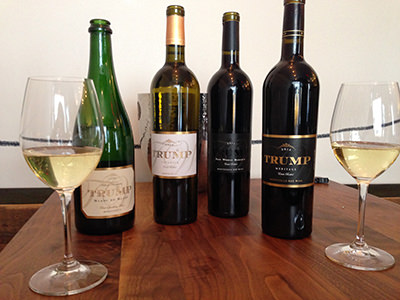In the rolling hills of Virginia, not far from the University he designed and founded, Thomas Jefferson made repeated attempts to grow vitis vinifera, meaning European grape varieties. After traveling in France, the Statesman had fallen in love with elegant wine, and was determined to plant the nation’s first vineyards. But the humid climate, and the prevalence of a New World vine pest called Phylloxera, kept defeating his efforts.
Today, Virginia wine country is flourishing, thanks in part to well-known and well-funded wineries like Barboursville, as well as the notable inclusion of a sparkling Virginia wine at a 2014 White House dinner, with none other than François Hollande as President Obama’s guest.
If the 2016 presidential elections go toward one candidate in particular, the White House may soon be serving all Virginia wine—because in 2011, Donald Trump himself purchased a 1300-acre Virginia winery (which his son Eric now owns) located mere miles away from Jefferson’s famed Monticello home. Curious about these wines, I asked Victoria James, the wine director at a Michelin-starred Manhattan restaurant Piora, to help me taste through four bottles from the Trump Winery. After all, we figured that with such a distinguished presidential history in Virginia, shouldn’t a presidential candidate making wine there be producing something really good? (A spokesperson for the winery says that Donald Trump does not drink, and has nothing to do with the winemaking itself.) Here’s how our tasting went.

Wine: Traditional Method Blanc de Blancs, 2009, $24
Victoria: This isn’t bad. It was probably acidified. As if it’s been toyed with.
VinePair: How do you identify that?
Victoria: It’s kind of Botox-y, it doesn’t feel completely natural. I do think it’s pretty delicious, and refreshing. But there’s a juxtaposition there—because it’s traditional method, you get that lees-y, Champagne quality, but then it’s not rich enough, and the acidity is disjointed. So it’s kind of trying to be a Prosecco, kind of trying to be a Champagne. $24 isn’t bad, but you could get some other great things for that price.
VP: The finish is weird. OK, let’s try some Viognier.
Victoria: Virginians love their Viognier. Although, I saw this recent Virginia wine magazine article, and it was like, “Viognier’s out, Petit Manseng’s in!”
Wine: Viognier, 2014, $24
VP: I actively dislike this wine. You know when you walk through the department store and they’re spraying perfume and you accidentally walk through it?
Victoria: Pungent. Like cheap perfume. I actually love the sparkling now, compared to this.
VP: I’m terrified about these reds.
Victoria: I’m sure they both taste the same. Which one’s more expensive?
VP: Let’s see . . .you know, I can’t believe Trump doesn’t drink at all.
Victoria: Does he even eat? I imagine he gets some kind of injection.
VP: I’m sure. So, the Meritage is $20 and the New World is $30. And it showcases their “best terroir.” That’s why it’s more expensive.
Wine: Meritage, 2014, $20
VP: Well, actually on the nose, I’ve smelled worse wine.
Victoria: This could actually be much more offensive. There’s not a ton of new oak, there’s not crazy high alcohol. The nose is true to the varieties—you get those black fruits and red fruits. It’s not great, nor is it terrible.
VP: I would probably think this was just cheap Bordeaux if someone blinded me on this.
Victoria: It tastes super cheap. But, it’s correct. It’s also just really boring. Like painfully boring. It’s really hard to make wine in Virginia because of the humidity. So the fact that it works at all, is something noteworthy. That sparkling wine is a porch pounder — you could drink it, sitting on a porch, on a plantation, for example.
VP: Should we try the other red? The one from their top terroir. It uses new oak, whereas the first one had only neutral oak.
Wine: New World Reserve, 2013, $30
Victoria: Well, the new oak softens it out. But it’s still disjointed.
VP: What do you mean by that?
Victoria: It just feels played with. For example if you’re making lemonade, you’re mixing the water, lemon juice, and sugar, and you want it to be balanced. Let’s say you want to make a diet version, so you use Splenda instead—and it’s no longer balanced, the natural acidity is overpowered by that weird sweetness, and it just feels off. They might be using artificial tannins, perhaps.
VP: How do you actually add tannin?
Victoria: It’s like a big bag of white stuff, and it’s just artificial tannin. I don’t think they are adding oak chips, though. You can tell money went into this wine. It tastes expensive but it has no soul.
VP: Do you think we should have a president who likes good wine?
Victoria: I think we should definitely have a president who drinks wine, for a start. At least Thomas Jefferson liked Madeira. This is almost the antithesis, because it’s made where Thomas Jefferson lived, but he would not have liked these at all. He would have been very disappointed!
